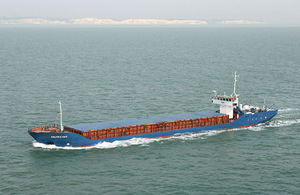News story: UK to lead charge in emerging maritime technology
A new strategy launched today (24 January 2019) will set the UK as a pre-eminent global test-bed of emerging technology, enabling the country to capitalise on the economic potential of maritime innovations.
The government has today set out its ambitions for the country to remain a world-leader in the maritime industry for the next 30 years.
The Maritime 2050 strategy outlines a range of short, medium and long-term proposals, including developing technology, people, and infrastructure, to keep the maritime industry in the UK flourishing.
These include establishing an innovation hub at a UK port by 2030, looking at ways to clean up emissions from the industry, and building on the world-class training already offered to seafarers.
Transport Secretary Chris Grayling said:
Maritime is a vital UK industry, bringing in £14 billion to our economy as well as providing thousands of new and exciting careers for people across the country.
This strategy is a clear message to the world – we will continue to be a leading maritime nation for the next 30 years and beyond.
We will be at the forefront of emerging technology and seafarer training and will capitalise on selling this expertise to companies across the world.
New legislation will introduce a domestic framework for autonomous vessels to enhance testing in UK waters. The Maritime and Coastguard Agency is looking at what is needed to ensure the safety of these and other ships. This will set the UK as the best place to trial this technology which will then attract international business and investment, providing a boost to the economy.
The UK will also pioneer the use of virtual and augmented reality in seafarer training as the government looks to establish a Maritime Skills Commission, bringing together leading experts to report in the existing and future needs of the industry – keeping it at the cutting edge of tuition.
Hugh McNeal, chairman of the Maritime 2050 expert panel, said:
Over the last year it has been a privilege to chair the expert panel which has brought together leaders from across the sector, from other world-class industries, academia and promotional bodies, to challenge and support the development of Maritime 2050. The result is a wide ranging and hugely ambitious blueprint for Britain’s future as a maritime nation ensuring the economy continues to grow successfully into the second half of the 21st century.
The recommendations published today will enable government and industry to work together to increase trade, attract investment and foster innovation across our thriving maritime sector, while progressing clean maritime growth.
A government-funded ‘People like me’ project will challenge the perception of the sector to attract more diverse talent. This builds on the work of the Women in Maritime taskforce, which is already working to increase the number of women employed in the industry.
Harry Theochari, chairman of Maritime UK, said:
For the first time the maritime sector has a real long term strategy – setting out what government and industry will do to position the UK as the world’s leading maritime nation over the coming decades in an increasingly competitive global context.
There are monumental opportunities for our sector – whether on technology, coastal economic development, attracting more maritime business to our shores or for the people that underpin our success.
The global ocean economy will double in value to $3 trillion by 2030. Competitor maritime nations are hungry for the prize, and Maritime 2050 will ensure that the UK is best-placed to capitalise. The task of turning these ambitious recommendations into reality rests on the strength of partnership between industry and government. Industry is committed to delivery.
By 2030, the government will develop a Maritime Innovation Hub, supporting new technologies while also boosting regional productivity with new jobs. And later this year, a Clean Maritime Plan will set out ways the UK will lead the way in green standards to reach zero emission shipping as quickly as possible.
